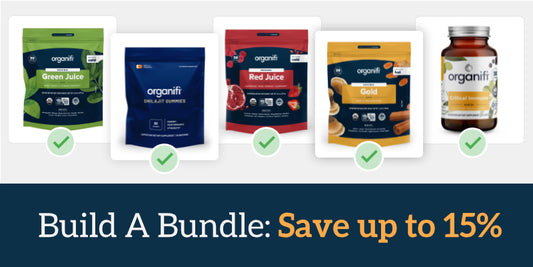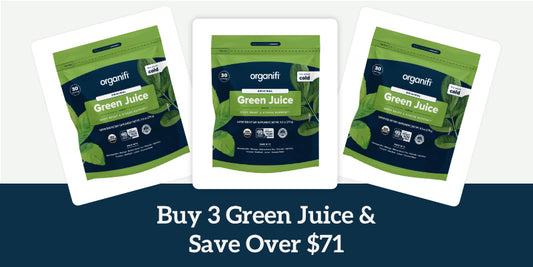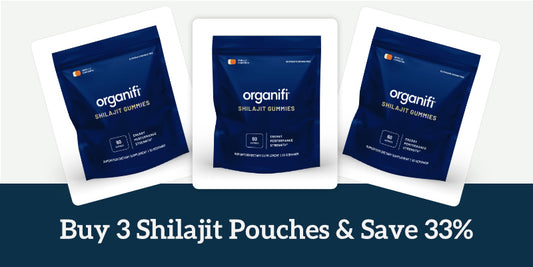Written by: Lindsay Sibson
Probiotics are essential for your digestive health, because they are the good
- Probiotics are essential for overall health; they support your immune system and ensure that your body adequately absorbs nutrients.
- The Standard American Diet (SAD) generally lacks these vital probiotics which lead to gas, bloating and uncomfortably loud yoga-class moments.
- Learning which foods are high in probiotics will help you incorporate them into your regular diet to better digest food, boost your immune system, avoid flatulence, bad breath, and help have a ‘summer belly’ year-round.
- Take our handy Probiotic Foods List to go grocery shopping and get more natural probiotics in your diet, stat.
Confession: I tooted during hot yoga.
And it wasn’t funny.
Well, OK - it was! But it didn’t feel so funny when it happened. Here I was trying to get fit and healthy, signing up for a sweaty Bikram Yoga class, wearing my favorite bum-accentuating leggings (the joke’s not lost on me), and feeling pretty damn good about myself, when the rear-end harmonic exploded.
Most people smiled, some laughed, and others just ignored it but, I was - at least at first- mortified.
When your gut microbiome is unbalanced, disturbing things can happen.
And not just at yoga.
Granted, that’s not a story I like to open with at parties, but it did set me on the path to figuring out what was happening with my gut, why I was always just a little bit bloated, and, of course, how to stop it.
Probiotics are essential for your digestive health because they are the good bacteria that line your gut and process nutrients.
The gut is considered the second brain of the human body. It does a lot more than help regulate bowel movements and assist in digestion; it’s connected to the actual brain, participating in proper cognitive function, decision making, mood, endocrine function, energy levels, and motivation.
Intrigued? Learn more about how the gut and the mind are linked.
Disturbances or imbalances in the gut may lead to:
- Gastrointestinal inflammation (bloating)
- Ineffective nutrient absorption
- Brain fog
- Depression
- Fatigue
- Compromised immune response
- Eating disorders
- Skin conditions
- Obesity
- More!
With that in mind, I set out to learn all about the gut and foods high in probiotics to get my gut in order and avoid other embarrassing bum-bomb situations.
Here’s everything you need to know to do the same! Make sure to grab our probiotic food list at the end.
Probiotics and Why You Need More in Your Diet:
Our bodies are full of bacteria; most of it is good and harmless and lives in the gut. Probiotics are good live bacteria and yeast that help your body process food, nutrients, and repopulate the gut when its natural sources have been depleted, due to antibiotics, illnesses, diet changes, and more.
The health benefits of probiotics include:
- Stronger immune system
- Improved digestion
- Increased energy from production of vitamin b12
- Better breath
- Destroys candida
- Healthier skin (improves psoriasis and eczema)
- Eases leaky gut symptoms
- Weight loss
- Reduced illnesses (colds and flu)
What Kind of Probiotics or Friendly Bacteria do I need?
The number of healthy bacteria in the body is so large that the bacteria to cell ratio is approximately 10:1. That means that ten bacteria microorganisms are working for you per each cell in your body. Therefore the gut microbiome has a vast number of “healthy bacteria” that interact with other systems to keep the body running at optimum levels.
To know which specific kind you need, you’d have to schedule culture studies with your physician. However, the most common good-bacteria we need to replenish often are the following:
- Lactobacillus acidophilus
- Lactobacillus bulgarius
- Lactobacillus reuteri
- Streptococcus thermophilus
- Saccharomyces boulardii
- Bifidobacterium bifidum
- Bacillus subtilis
Unfortunately, it’s easier than it seems to deplete your natural stores of these good guys. Here are some common causes that may lower these common healthy gut bacteria:
- Food poisoning (your gut flora needs to be rebuilt after it has flushed out harmful agents.)
- Yeast or candida infections.
- Urinary Tract Infections
- Skin conditions such as dry skin patches, eczema flare-ups, dullness, unexplained rashes.
- Upset stomach (from constipation to diarrhea to flatulence)
- You’ve taken antibiotics and didn’t replenish your gut bacteria afterward. Antibiotics don’t just kill the bad guys; they wipe everything out. The effects of some antibiotics may be felt in the gut microbiome up to five years after treatment.
- A high-sugar or high-fat diet. Sugar feeds and promotes overpopulation of unhealthy gut bacteria, killing the good one and leading to “cravings.”
- Stress and emotional ups-and-downs.
- Bloating that doesn’t seem to go away with diet or exercise.
All of these causes and symptoms may be your body’s way to signal you need those probiotics. Let’s take a look at how you can incorporate more into your diet right away.
10 Ways To Get Probiotics in Your Diet This Week
There are multiple ways to consume more probiotics: eating foods high in probiotics, probiotic-rich drinks, and healthy probiotic supplements. Find the right match for your lifestyle:
Try Foods High in Probiotics
#1 Yogurt:
There are tens of billions of bacteria in each serving of yogurt. Producers add cultures of bacteria after the milk has been pasteurized to ensure the bacteria endures. Look for an organic plain, sugar-free, yogurt that has live and active cultures. Greek yogurt is excellent for this.
#2 Kefir:
A probiotic fermented milk drink made combining Kefir grains (lactic acid bacteria and yeast) with cow or goat milk. While neither yogurt nor Kefir are vegan-friendly, Kefir may be better for people who are lactose intolerant and could be superior to yogurt in probiotics benefits.
#3 Live Sauerkraut:
A fermented food made out of shredded cabbage and live lactic acid bacteria. A great addition to hot dogs, salads, baked potatoes, and lean meats. Make sure you get unpasteurized saurkraut so, it has live probiotics. As the most vegan-friendly foods high in probiotics.
#4 Kimchi:
This spicy Korean side dish is also a fermented food, and therefore an excellent source of probiotics. It has Lactobacillus kimchii, in addition to other vitamins and minerals good for overall health.
#5 Miso Soup and Tempeh
It’s not all animal milk and sour foods, so vegans and the spice-challenged can rejoice: probiotics are readily available in miso soup and tempeh, fermented soybean products.
#6 Pickles
A sandwich favorite and low-calorie snack, pickles are one of those sneaky foods high in probiotics because the fermentation process uses their own, naturally-occurring, lactic acid bacteria. Do bear in mind pickles tend to be high in sodium so maybe don’t eat them every day.
#7 Natto:
If you hadn’t heard of Natto before, that’s OK. This typical breakfast food from Japan contains Bacillus Subtillis and it is also a fermented food made out of the soybean. Since natto may also help prevent osteoporosis, and increased bone density - it’s becoming a staple on our end.
Drink Your Probiotics On the Reg:
#8 Try Kombucha:
A slightly sweet and bubbly drink that is made by fermenting black tea with a “scoby” (a colony of bacteria) that packs billions of gut-friendly organisms.
#9 Make Kefir Smoothies:
Not a fan of drinking milk on its own? Make a smoothie! Kefir contains 10 to 20 different types of bacteria, so mix it with your favorite fruits and veggies.
#10 Add Apple Cider Vinegar:
It’s an easy and cheap way to get more probiotics in your diet. Just pour some into your water or use as a salad dressing. The health benefits of apple cider vinegar include lowering blood pressure, cholesterol, and promoting weight loss.
Try a Supplement!
Too busy to start hunting for foods high in probiotics? Not excited about the probiotic foods list? Get a supplement that has multiple good bacteria strains in it, like Organifi’s Biotic Balance. It has 50 billion colony-forming-units or CFUs that promote healthy gut balance, provides digestive support, and helps offset the damage of modern sugar-filled foods.
BONUS! Eat Prebiotic Foods:
Prebiotic foods are particularly high-fiber plants that feed your gut’s beneficial bacteria. They support probiotic activity in the digestive tract and happen to be your body’s preferred bacteria-food. What to eat:
- Beans
- Brussels sprouts
- Chicory root
- Asparagus
- Garlic
- Leeks
- Onions
Take it Home:
Whether you use one or all of these recommendations, incorporating more probiotics into your diet will surely enhance your health and give you the vibrant energy you need to live a fantastic life!
Go grocery shopping with this probiotic foods list:
- Plain Greek Yogurt (enhanced with live culture)
- Kefir Milk
- Coconut Kefir (for vegans!)
- Skyr (traditional Icelandic yogurt)
- Unpasteurized Sauerkraut
- Kimchi
- Miso Soup
- Tempeh
- Pickles
- Fermented Foods
- Natto
- Kombucha
- Apple Cider Vinegar
- Brine-cured Olives (check the labels)
- Kvass drink (alternative to Kombucha)
Bear in mind that your gut’s health depends on various factors and that no single food source has all the different types of healthy gut bacteria you need. Mixing several probiotic foods or getting a supplement to support the balance of your microbiome, is the easiest way to get a varied group of strains to repopulate and harmonize the gut.
About The Author
Lindsay Sibson turned her lifelong dream of traveling the world into a reality when she first stepped on a plan in April of 2014. With the simple intention of learning more about this beautiful world, she stepped away from corporate America to explore an alternative lifestyle of long term international travel, volunteering, blogging and pursuing a blissfully happy and fulfilling way of life.




